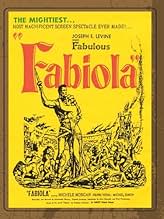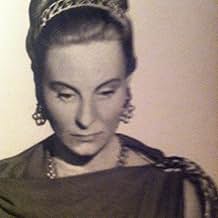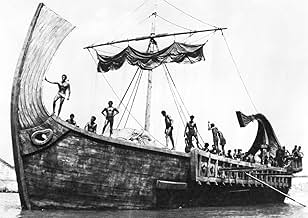Füge eine Handlung in deiner Sprache hinzuIn ancient Rome a love story blossoms between Fabiola, daughter of a senator, and Rhual, a Gallic gladiator. After Fabiola's father is killed, the Romans blame the Christians and the persecu... Alles lesenIn ancient Rome a love story blossoms between Fabiola, daughter of a senator, and Rhual, a Gallic gladiator. After Fabiola's father is killed, the Romans blame the Christians and the persecution begins. Rhual confesses to being a Christian, is accused of the murder and sentenced ... Alles lesenIn ancient Rome a love story blossoms between Fabiola, daughter of a senator, and Rhual, a Gallic gladiator. After Fabiola's father is killed, the Romans blame the Christians and the persecution begins. Rhual confesses to being a Christian, is accused of the murder and sentenced to fight to the death in the arena.
Empfohlene Bewertungen
The movie was first divided into two parts when it was shown in the movie theaters in Europa.
First part is called "mirage of Rome".A young gladiator (the athletic Henri Vidal)is heading for Rome where he thinks he will find fortune and glory.He stops at the villa of Fabius Severe (Michel Simon) and his daughter ,the beautiful Fabiola (Michèle Morgan;at the time ,she and Vidal were the ideal couple for the young girls of the era:their love was not only on the screen).Oddly ,the plot takes a whodunit turn with a Roman Agatha Christie flavor as Severe is murdered in the middle of the night. In parallel,we see the Christian faith rise,mainly among the slaves.
Second part is called "blood of the martyrs" ,and quite rightly so,because sadism in the tortures easily equals Cecil B De Mille .We also attend the martyrdom of a muscular Saint Sebastian (Massimo -spelled Maximo- Girotti,who,just before he dies,tells the soldiers a story of long ago and far away ,away in a manger. This second part begins with an interminable summary of the first part,which tends to show that the two parts were not shown at the same time (eg you had to pay twice when it was first released in theaters).Then a trial (yes!) ,a very long trial,of course iniquitous , at the end of which the Christians become scapegoats.Then ,on with the show,that is to say the circus is in town,in the arena, where the director describes the executions in lavish detail.
Do not get me wrong:"Fabiola" is one of the best (maybe simply the best )peplum Europa has ever produced .Morgan is lovingly filmed ,particularly in that scene where Vidal mistook her for a statue. The tempo is fast,leaving the viewer no respite.The historical background includes the antagonism between Constantin,the Christian emperor -although some historians claim he was christened just before he died-,and Maxence ,the pagan one.All in all it compares favorably to "quo vadis" and shows more imagination than,say "gladiator".
Of course the dubbing is atrocious and the sound effects and music score suffer terrible desecration as well. It was quite lavishly produced (in black-and-white, alas!) and the costumes, by Veniero Colasanti, especially, are exceptionally well done. (His very professional work was featured in a trio of Samuel Bronston-produced epics some years later, "El Cid," "55 Days at Peking," and "The Fall of the Roman Empire.") Over a dozen writers, credited and uncredited, had a hand in preparing a screenplay from Nicholas Cardinal Wiseman's monumental novel, and character motivations and dialogue, at least in the dubbed version, are something to ignore as the spectacle unfolds.
The cool blonde beauty of Michele Morgan, in the title role, is put to good use, though she seems quite wooden, something that is usually said about a male hero in films of this type. Henri Vidal, as Rhual, is, in contrast, quite animated and acquits himself as well as can be expected amid the impossible machinations of the scenarists.
A purveyor of off-beat and hard-to-find titles has this title available, culled from a less-than-perfect (to say the least) 16 mm print but it's worth a look if your taste runs to sword-and-sandal stuff set in ancient Rome with Christians in peril and Roman mobs lusting for their gruesome extermination.
Despite its weaknesses it remains an absorbing experience and contains some immensely powerful and moving scenes, not least the martyrdom of Saint Sebastian and the climactic sequence in the Coliseum circus of horrors.
The film is credited with enabling the rebirth of Italian cinema after the disorder of the War but is also thought to have facilitated the arrival of Hollywood with films of a similar nature, notably 'Quo Vadis' as well as being a template for numerous home-grown Peplum movies that followed.
It is a Franco-Italian production and features excellent artistes from both countries. The title character is beautifully played by a luminous Michele Morgan whilst handsome hunk Henri Vidal is the gladiator for whom she falls. Hardly surprising that the chemistry between them is palpable as they were to be married when filming was completed. Louis Salou is pitch perfect as the scheming villain whilst acting honours must go to Michel Simon for his by turns ebullient and touching performance as Fabio. He has too little screen time alas and his character's demise leaves a void. On the Italian front there are strong performances from Massimo Girotti, Gino Cervi, Carlo Ninchi and Elsa Cegani. The score by Enzo Masetti is magnificent and the post-sychronisation is well done with the voice of Fabiola provided by the queen of the dubbers Lydia Simoneschi.
The film has been released with various running times and the severely trunctated, dubbed version for North American viewers is not recommended.
Part 2 is entitled 'Blood of the Martyrs' and certainly lives up to its name as the carnage in the Coliseum is graphically depicted. There may very well be a sub-text here as the film's dedication would indicate a reference to the Holocaust.
Wusstest du schon
- WissenswertesThe story is based on the 1854 romance novel of the same title written by Nicholas Patrick Wiseman, a Roman Catholic cardinal and archbishop of a then-newly established Catholic diocese of Westminster.
- Alternative VersionenItalian version runs 164 minutes; shortened (96 minutes) and re-edited English-dubbed version was released in the USA in 1951.
- VerbindungenFeatured in Le viager (1972)
Top-Auswahl
Details
- Erscheinungsdatum
- Herkunftsländer
- Sprache
- Auch bekannt als
- The Fighting Gladiator
- Drehorte
- Produktionsfirmen
- Weitere beteiligte Unternehmen bei IMDbPro anzeigen
- Laufzeit2 Stunden 28 Minuten
- Farbe
- Sound-Mix
- Seitenverhältnis
- 1.37 : 1
Zu dieser Seite beitragen





































